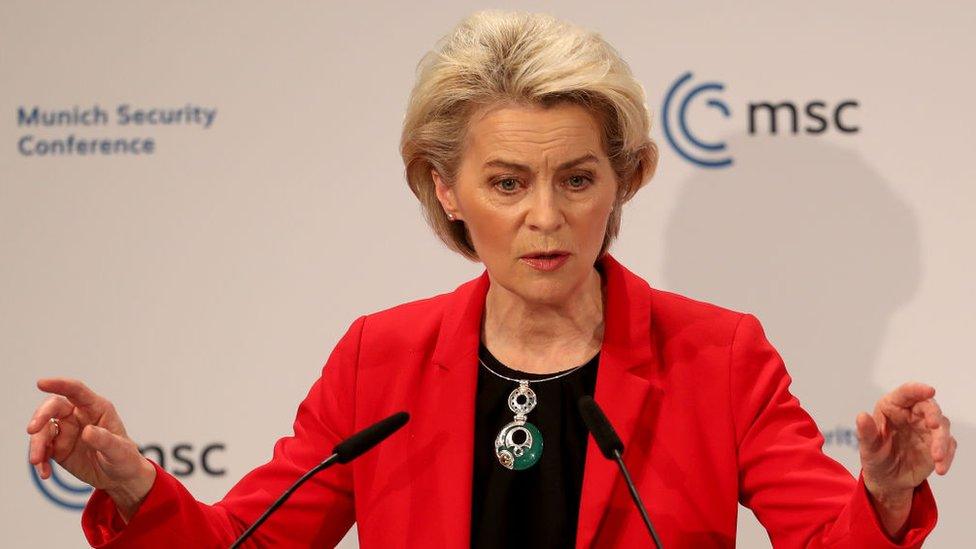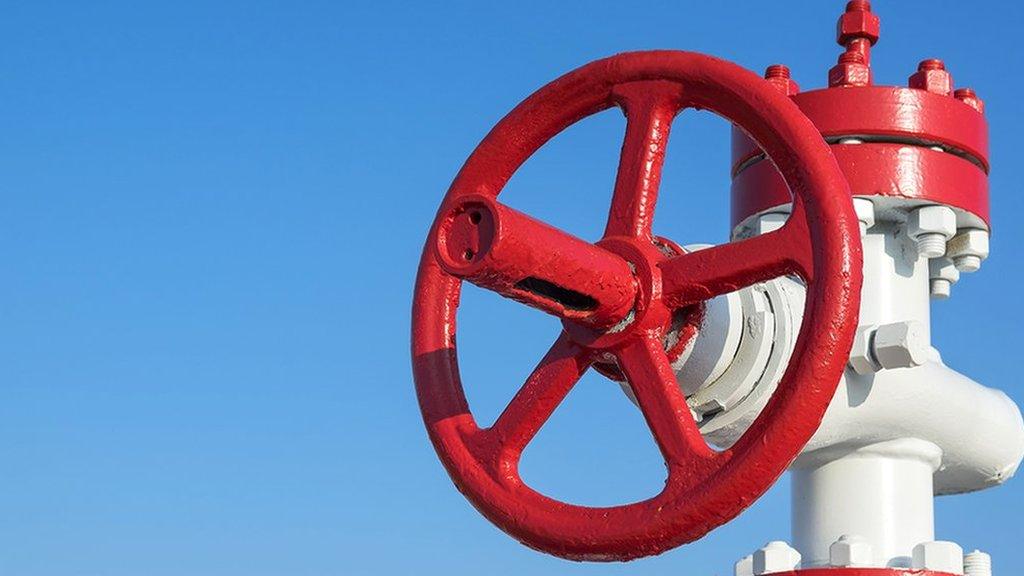OMV: European energy firm mulls Russia rouble demand
- Published
- comments

One of Europe's biggest Russian gas importers says it must decide by May whether to bend to Moscow's pay demands without undermining Western sanctions.
Austria's OMV said it had received a request from Russia's Gazprombank about paying for gas in roubles.
Russia has demanded nations pay for oil and gas in roubles and some firms are considering doing so amid supply cuts.
But there is concern the system, where firms pay in euros which are converted into roubles, breaks sanctions.
OMV's chief executive Alfred Stern, said on Friday that the firm is still paying for natural gas in euros, but its next invoice was due in May.
"We are analysing this and coming up with solutions that are sanctions-compliant," he said.
It comes after Uniper, one of Germany's biggest energy firms, said on Thursday that it would use the controversial payment mechanism after gas supplies to Poland and Bulgaria were cut off.
In late March, Russia said "unfriendly countries" would have to start paying for its oil and gas in roubles after Western allies froze billions of dollars the country held in foreign currencies overseas following its assault on Ukraine.
Under the decree, non-Russian buyers of gas must pay euros or dollars into an account at Gazprombank, the Swiss-based trading arm of Gazprom, and then convert this into roubles in a second account in Russia.
The move is being seen as an attempt to divide Western allies in their response over the war, which has highlighted which European countries are heavily dependent on Russia for energy supplies.
EU Commission president Ursula von der Leyen has warned that complying with Russian demands would breach EU sanctions and would be "high risk" for companies that did so.
But a spokesman for Uniper told the BBC: "For our company and for Germany as a whole, it is not possible to do without Russian gas in the short term; this would have dramatic consequences for our economy."

Ursula von der Leyen said the EU will support member states impacted by any gas freeze by Russia
Mr Stern insisted that OMV "will be compliant with all sanctions and regulatory requirements".
OMV also confirmed that it does still hold some local accounts in Russia for "office activities" like paying rents in roubles, which its chief executive said were nothing to do with gas payments.
Mr Stern condemned the "unprovoked attack on Ukraine", which he said has "created immeasurable human suffering".


President Vladimir Putin wants energy firms from "unfriendly countries" to pay for their gas in roubles - but why? There are several reasons.
For a start, it increases demand for roubles, supporting the currency and helping to keep inflation under control.
That should, in theory, reduce the hardship faced by Russian consumers and create space for the central bank to cut interest rates.
But the way in which the transactions are meant to be carried out also helps Gazprombank avoid becoming a target for EU sanctions - because it is used as a middleman.
Then there's the fact Russia doesn't want to become overloaded with euros or dollars because the ways in which it can now use them are strictly limited.
But perhaps the biggest benefit for President Putin is that his actions have already sown discord - creating confusion and disunity within the EU over whether or not his demands can or should be met.

OMV group reported better-than-expected results for the first three months of 2022.
Mr Stern said that gas prices had been pushed higher by increased demand from industry and concerns around supplies due to the conflict.
Higher prices off-set a big hit OMV took from its loan for the Nord Stream 2 gas pipeline, which was designed to increase gas flows from Russia directly to Germany, but has now been put on hold because of the war in Ukraine.
Sales in the first quarter jumped by 146% to €15.8bn, although its net loss widened to €1bn.
The group has also stopped all future investments in Russia.
Looking ahead, Mr Stern added that forecasting the company's performance was "very difficult".
According to the Financial Times, external, Italy's Eni is also considering opening a Swiss account with Gazprom in order to maintain gas supplies.
In an update to investors on Friday, its chief financial officer Francesco Gattei said: "We will pay the gas in strict compliance with contract terms and following international sanctions. We will respect all these rules."
The company has until the end of May, when its next payment for Russian supplies is due, to make a final decision.
Mr Gattei said that the currency of its gas contract was in euros, the invoices it has received to date have all been in euros, and it hasn't opened a rouble account yet.
Related topics
- Published28 April 2022

- Published26 January 2023
